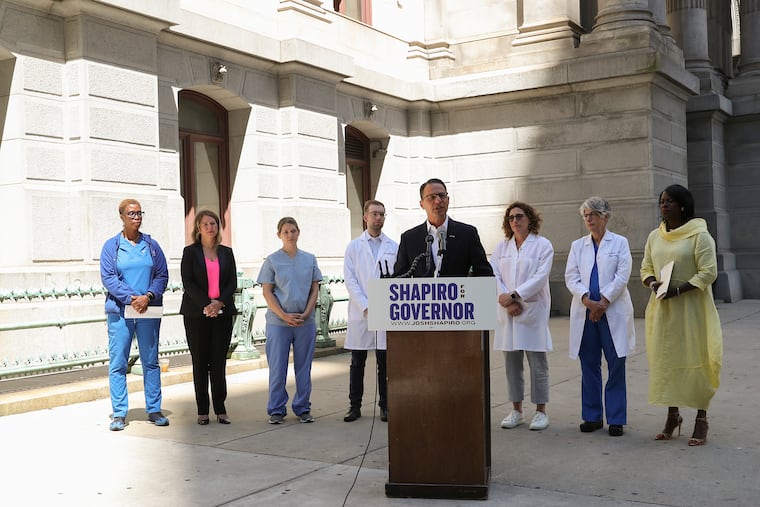Dear Shapiro and other campaigners: Please quit your day job
In Philadelphia, elected officials can’t run for another office without resigning from their current position. This is a good thing.

Josh Shapiro has a full-time job. So does Doug Mastriano. Likewise John Fetterman and the two candidates for lieutenant governor, Democrat Austin Davis and Republican Carrie Lewis DelRosso. All of them hold public office, and yet find time to run for a different elected position, while still claiming to be fulfilling all of the responsibilities of their current jobs.
Either these elected officials are the hardest-working people in Pennsylvania, or the taxpayers are not actually getting the performance they were promised when they elected these campaigners to their current positions.
I think we know which of these is more plausible.
In any private-sector job, it would be laughable to tell your boss you’re leaving for months to go look for another job — while still taking home your whole paycheck. In politics, it’s standard operating procedure.
Not every state allows this practice, but Pennsylvania does. With one exception: Philadelphia.
In Philadelphia, elected local officials have to follow the “resign-to-run rule,” which states they cannot run for another office without resigning from their current position. It’s one of the few signs of good and honest government in the city these days, which traces its roots back to the Home Rule Charter of 1951.
» READ MORE: The 2023 race for Philly mayor is starting soon. Meet the candidates who might run.
As Mayor Jim Kenney’s final term comes to a close — not as quickly as he would prefer, perhaps — City Council members who would be contenders for his job will have to choose between doing the job to which they were elected and campaigning for a new one. So expect resignation letters to start arriving in the coming months.
This is a good rule. It provides that officials’ constituents receive a full day’s work for a full day’s pay, and concentrates the minds of would-be candidates, making them think twice before running a campaign they likely will not win.
Compare that to the situation in the surrounding counties. Two of Montgomery County’s three county commissioners — Democrat Val Arkoosh and Republican Joe Gale — just spent much of the last year wandering the state in pursuit of a different job (U.S. Senate in Arkoosh’s case, governor in Gale’s). Neither of them ever got close to winning one of those nominations. Are we expected to believe they were giving 100% at their day jobs while also moonlighting on the campaign trail?
This behavior is common among career politicians. Indeed, Gale likes running for office so much that he ran for lieutenant governor in 2018 despite being constitutionally ineligible for the office (he had not yet reached the minimum age of 30). And he is not the only one.
Consider Shapiro, a former Montgomery County commissioner who has made a career of running for one office while holding another. Shapiro was a member of the Pennsylvania House of Representatives the whole time he campaigned for the county commissioner seat in 2011. He won reelection in 2015 before immediately campaigning for a new job in 2016: attorney general. Reelected to that job in 2020, he quickly started a new campaign, this time for governor.
None of this would be allowed in Philadelphia, and for good reason: A person cannot possibly do two jobs well at the same time.
“A person cannot possibly do two jobs well at the same time.”
In Shapiro’s case, the overlap is especially troubling. As the commonwealth’s chief law enforcement officer, his actions often overlap with political policy. All prosecutors have some discretion — the laws are many and their resources are limited. But in exercising that discretion while campaigning for office, Shapiro raises conflicts of interest and the appearance of impropriety with every action.
That accords with what The Inquirer Editorial Board said in 2010, when Attorney General Tom Corbett was the Republican nominee for governor while still serving as AG. “It’s nearly impossible lately for the public to separate Corbett’s law enforcement duties from his role as the GOP nominee for governor,” it wrote. “Increasingly, his actions as attorney general are tinged with political ramifications for the November election.”
“Elected officials frequently run for higher office without giving up their current post,” the 2010 editorial continued. “But a prosecutor’s job is very different. ... Law enforcement should be as free as possible from the taint of political motivations.”
It is true. Every action of the state Attorney General’s Office in the past year must be seen through two lenses: whether it was the right way for Attorney General Josh Shapiro to enforce the law, and whether it was the best way for gubernatorial candidate Josh Shapiro to get people to vote for him or donate to his campaign. Shapiro’s statement on last month’s Supreme Court decision in Dobbs v. Jackson Women’s Health Organization, for example, feels more like a campaign fund-raising letter — calling Dobbs “a shameful moment for our country” and so forth — than a policy paper.
This goes on in every election cycle and gives an unfair advantage to incumbents. The state should take a page from the Philadelphia City Charter and make politicians earn their paychecks.
Kyle Sammin is editor-at-large at Broad + Liberty.